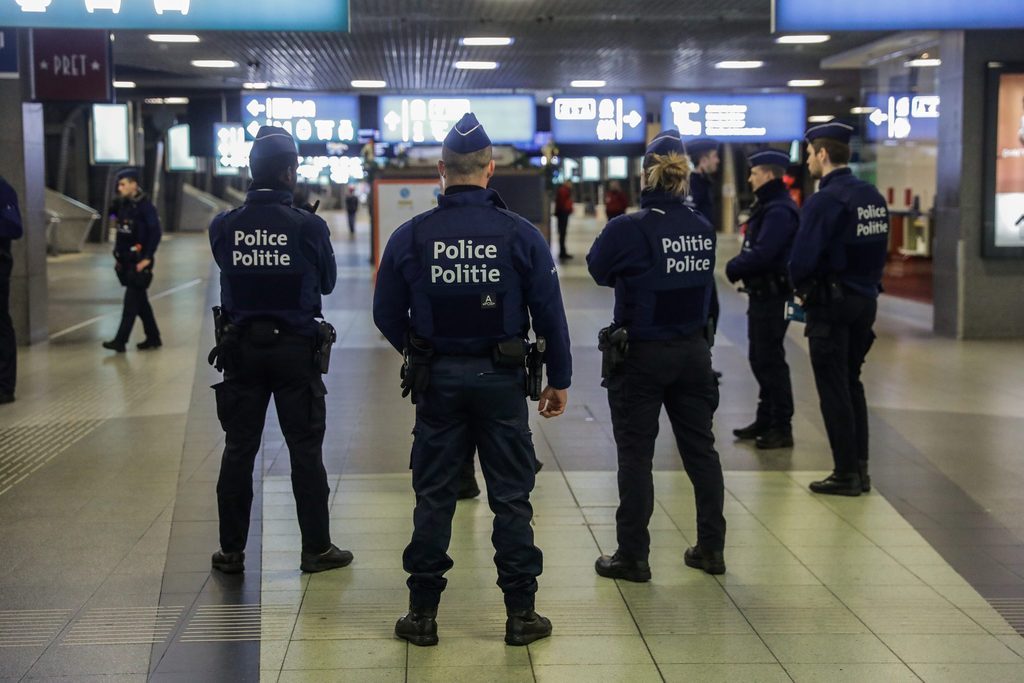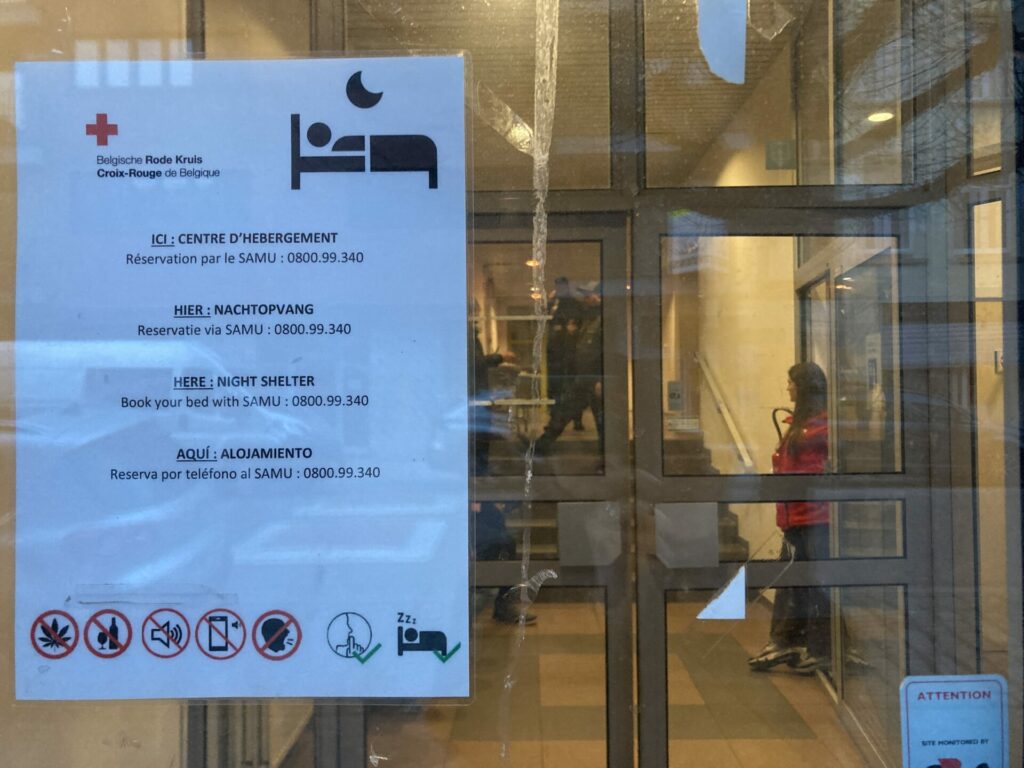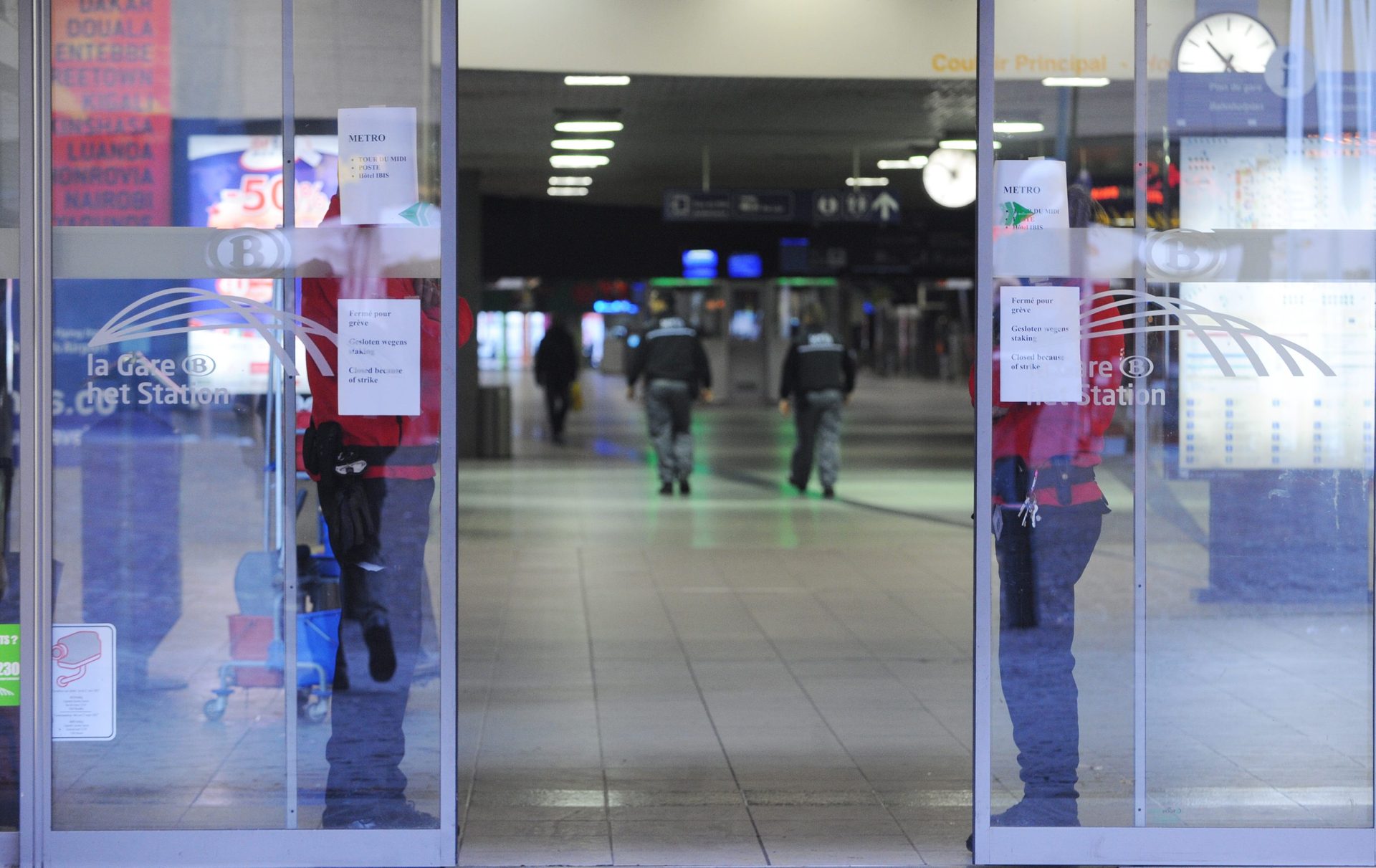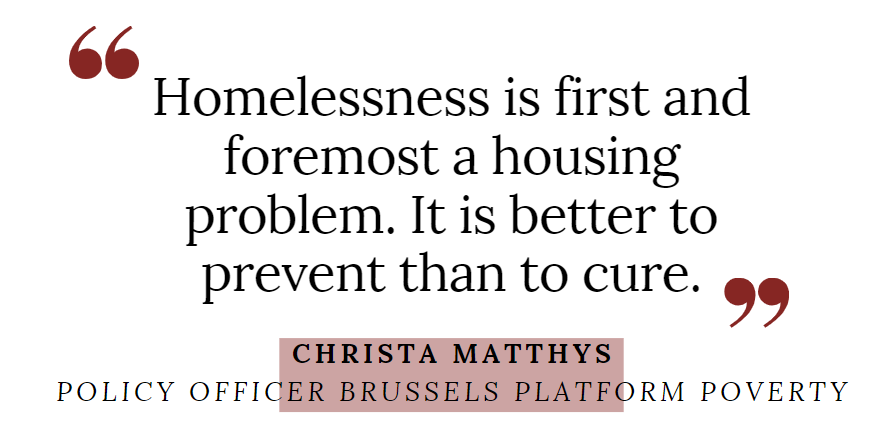Belgium's national railway company SNCB announced that it is opening part of the Brussels Midi station to provide shelter to homeless people during cold nights. But help organisations argue that this is hardly sufficient to answer the city's homelessness problem.
Over 7,000 homeless or poorly housed people live in the Brussels-Capital Region, according to the most recent census at the end of 2022. On top of the over 5,000 places in the regular shelter system, some 150 emergency places are now being created as part of the "Extreme Cold" plan.
However, this still leaves thousands of people on the streets as temperatures drop well below 0°C.
"Last night, we opened an area in the Brussels Midi station, under supervision, for homeless people who cannot find a place in the usual shelters, to get out of the freezing cold," Bart Crols, spokesperson for SCNB, told The Brussels Times.

Police at Brussels-Midi railway station. Credit: Belga/Thierry Roge
Sunday night was the first time the Brussels Midi was opened this year, but SNCB has been doing this for several years. Some 20 people were able to shelter in the station, Crols said. "It mostly concerns the people who are usually in the area. They can stay inside after the last train leaves around 01:00 until the first train arrives around 05:00."
"Everything went smoothly and this arrangement for shelter will remain in place for as long as the temperatures fall below zero," he explained. This emergency shelter measure is part of the Capital Region's 'Extreme Cold' plan, activated during severe weather conditions based on a decision by homeless organisation Bruss'help in consultation with the various political cabinets.
In addition to SNCB keeping the Midi station open when temperatures are at or below 0°C, Brussels public transport company STIB will also allow people wandering around the non-paying public areas of its station to remain there, even outside operating hours.
'Extreme Cold' plan
The plan aims to provide care for the most vulnerable people in particularly harsh weather conditions and was activated in response to the drastic drop in temperatures forecast for the coming days. There are also plans to create 145 emergency places in Samusocial and Red Cross centres, Eva Salman, communication manager for Bruss'help, told The Brussels Times.
Of these, 55 additional places are available in Samusocial's reception centre for single men in Anderlecht (30 places) and in its emergency reception centre for families in Auderghem (25 places). They will remain available for at least one month, with a possible extension depending on the weather conditions.
The Belgian Red Cross is also opening a new reception centre in Anderlecht with a capacity of nearly 100 places. This is a reception centre for all homeless people, open 24 hours a day.
For Brussels poverty organisations, the 'Extreme Cold' plan for the homeless is nothing more than "putting a plaster on a bullet hole." To tackle the problem structurally, there is an urgent need to deploy 'Housing First' measures, as well as the construction of additional social housing in Brussels.
"Homelessness is first and foremost a housing problem," Christa Matthys, Policy officer of the Brussels Platform Poverty, told Belga News Agency.
While she welcomed several measures already taken – such as the ban on evictions in winter – by Brussels Social Action Minister Alain Maron (Ecolo) and State Secretary for Housing Nawal Ben Hamou (PS), she stressed that there is still too little cooperation between different policy areas and levels.
"The Federal Government allocates too few resources to provide reception for those going through the asylum procedure. And not all municipalities are making equal efforts either," Matthys said.
Housing First
Previously, the homeless organisation Doucheflux also denounced that these emergency measures would not be enough. "It is as if, every year, the authorities are surprised that it is cold in winter," they told Bruzz.
To address the problem in the long term, the competent authorities must step up efforts to implement 'Housing First' measures – a policy to provide permanent housing for homeless people as soon as possible. Alongside personalised counselling, this would structurally tackle possible trauma, drug and health problems.
Doucheflux also calls for new social housing in the Capital Region, citing the high rents in Brussels as the root of the problem. "The number of homeless people in Brussels will not yet fall immediately, as prices will remain high."
While 'Housing-First' is part of the solution, it remains only a remedial tool. "It is better to prevent than to cure. We are in favour of a compulsory rental price framework and the construction of additional social housing in Brussels," Matthys said.

A sign on the front door, at the opening of a Red Cross emergency accommodation centre for homeless people in Anderlecht, Monday 08 January 2024. Credit: Belga/Lou Lampaert
In the long term, Bruss'help is calling for an increase in 'Housing First' schemes, as well as an increase in negotiated occupancy schemes which provide a springboard to housing and social reintegration.
"First and foremost, the 'Extreme Cold' plan is a crisis plan to deal with the freezing temperatures," François Bertrand, director of Bruss'help, told The Brussels Times. "It aims to provide shelter from severe frost for people identified on the streets."
He underlined that this is an emergency measure by the region's aid organisations, who are doing as much as possible with limited means at their disposal. "It comes in addition to the four-seasons plan, which provides accommodation for about 5,000 people in emergency centres, negotiated occupancy and integration hostels."
This provides 5,045 accommodation places, of which 3,084 are emergency accommodation places, 937 places in temporary occupation of empty buildings and 1,024 places in hostels.
Related News
- Brussels activates 'cold weather plan' for homeless people on Monday
- Thousands of asylum seekers face 'disastrous consequences' without shelter
- 'Like zombies': What is driving the crack crisis around Porte de Hal?
Brussels Minister Maron stressed that on a dignified longer-term reception should be provided for all applicants for international protection at Fedasil, the agency responsible for the reception of asylum seekers.
"As long as there are so many applicants for international protection who are not taken care of by the federal authorities, there is a risk that we will continue to end up in such situations," he said. "Brussels advocates a better distribution of people seeking international protection; currently two-thirds of them are in Brussels."
Policy officer at Vluchtenlingenwerk Vlaanderen (Refugee Work Flanders), Thomas Willekens, agreed that this is the best solution to get people off the streets. "The distribution plan is the most suitable: with five additional reception places per municipality, you work away the waiting list."
Looking after vulnerable people on the streets
For people who know (of) a homeless person in difficulty or see someone who needs help in the streets, Bruss'help recommends the following actions:
- Call the free Samusocial emergency number: 0800 99 340,
- Be precise when describing the person (location and any difficulties identified),
- If the person appears to be in immediate physical distress, report it to 112 (medical emergencies). In this case, do not leave them alone and wait for help.


